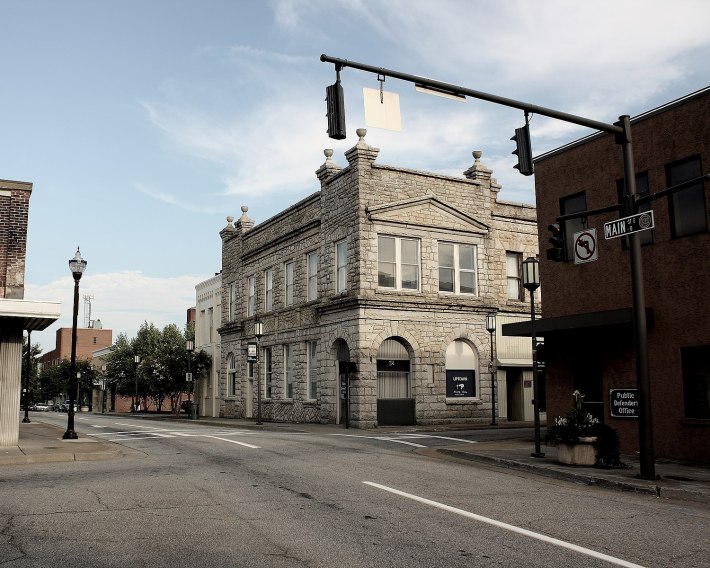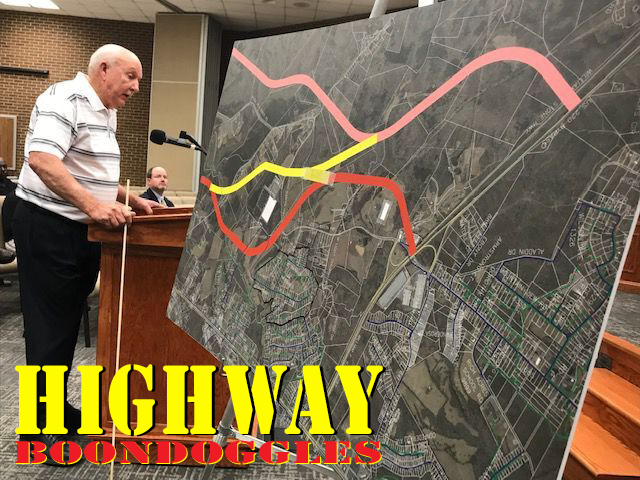This article is part of our annual Highway Boondoggles series, in partnership with U.S. PIRG. This series has explored some of the worst planned highway projects across the country, and explore why they deserve to be cancelled — and why U.S. transportation policy must be reformed to discourage similar initiatives in the future. Learn more about the other boondoggles that made this year's list by clicking here. You can also view the full report here.
Martinsville Southern Connector, Va.
Cost: $745 million
The Virginia Department of Transportation’s proposed Martinsville Southern Connector would be an eight-mile bypass of Route 220 in southwestern Virginia running between Route 58 near Martinsville, Va., and the North Carolina border. The nearly $745-million project would damage hundreds of acres of forest, wetlands and farmland and force 21 families to relocate while providing few benefits to an area whose population has been shrinking for decades and overlooking less costly and less damaging alternatives to upgrade the existing route.
According to VDOT, the project is necessary to accommodate regional through-traffic, ease congestion and address safety concerns. The agency predicts a very large increase in the use of Route 220 and the proposed new road in the next few years: a 33.1-percent increase in total vehicle miles traveled over the existing usage by 2025, and a 56.7-percent increase in VMT by 2040.
However, those predictions are at odds with reality — the current population of Martinsville and surrounding Henry County is 64,000 and has been shrinking for decades. It is predicted to fall another 18.6 percent by 2040. The project is also at odds with the state’s climate goals, which call for net-zero greenhouse gas emissions by 2045, including from transportation. The Southern Environmental Law Center and a coalition of other groups have argued that not only did VDOT do an inadequate study of the effects on greenhouse gas emissions from vehicles on the proposed road, they also failed to consider alternatives to widening Route 220 or building a new road, and failed to take into account the emissions effects from the destruction of carbon sinks associated with building the road.

The proposed Martinsville Southern Connector would furthermore come at a significant environmental and social cost. In addition to the impacts on 52 residential properties and the potential for 21 residential relocations, the project could divide the nearby community, introduce unpleasant noise and sights, require the relocation of a cemetery, and impact or destroy 298 acres of forest, 292 acres of farmland, nearly 18,000 linear feet of streams (some of which are already too polluted for recreation according to the U.S. EPA) and five historic sites. VDOT anticipates adverse effects on eight of 10 local resources – land use/community cohesion, community facilities, environmental justice, water resources, floodplains, wildlife habitat, threatened and endangered species, and archaeological sites — and a beneficial impact on only one: economic resources.
And for all those impacts, the community would see little benefit. Any induced growth from the new road is likely to “involve the clearing of land rather than infill or redevelopment.” Travelers in the area would see an increase in average vehicle speed of just 0.4 miles per hour over current speeds with the new road in place.
These concerns are heightened by the availability of less costly and less damaging alternatives. Project opponents argue that VDOT has failed to consider alternatives other than a new bypass or massive widening of Route 220, including recommendations VDOT itself recently made for targeted and cost-effective improvements to the existing corridor.
The Martinsville Southern Connector’s $745-million cost is currently unfunded and it is unlikely to receive funding under the state’s transportation funding prioritization program, according to the Southern Environmental Law Center and its partners. VDOT already spends nearly $390 million per year on servicing transportation debt, and has a yearly construction budget of just $3.3 billion. It is also unclear that the local community supports the project: in an online survey about VDOT’s selected design (which was later adjusted to become the Preferred Alternative), fewer than half the respondents supported VDOT’s decision. A VDOT presentation in December 2019, compiling results from the online survey and public comments submitted via other channels, showed that the preferred alternative had the support of only 26.6 percent of those who contributed.
The project’s enormous price tag, environmental and community impacts, dubious benefits and lack of clear public support indicate that VDOT should reconsider how it can address the safety and congestion needs of the community without building a boondoggle.






